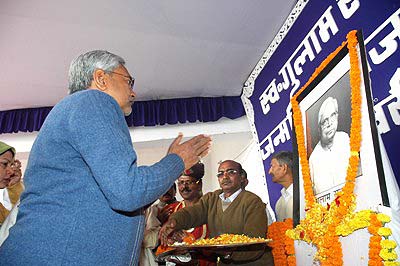(Bihar Times): Bihar chief minister Nitish Kumar on
Thursday found himself neck-deep in the Urdu
controversy. He was present at a function organized in
memory of former speaker and the Rashtriya Janata Dal
leader, late Ghulam Sarwar.
He was supposed to announce January 10, Sarwar’s
birthday, as the Urdu Day; however, was forced not to
do so not by the opposition leaders but by his own
trusted partymen. They vociferously opposed the move.
The former chief minister, Dr Jagannath Mishra, openly
came out against the proposal a day before the
programme and when the function actually started his
supporters demanded that instead November 19 be
declared as the Urdu Day.

Nitish managed to play safe. The chief minister
showered praise on Sarwar, though while alive the
latter was a close ally of bete noire, Lalu Yadav, who
used to address him as Chacha.
The problem with Nitish is that he has, of late,
started playing too many Muslim cards––and all out of
sudden. This is bound to have a detrimental impact. He
failed to realize that before Lalu Yadav became the
darling of Muslims, it was Dr Jagannath Mishra who
used to be addressed as ‘Maulana’ by a section of
Urdu-lovers. Now he wants to regain that lost support
and would never allow Nitish to ignore him.
Sarwar’s past continues to haunt many living
politicians. He was staunchly anti-Congress throughout
his life and was no friend of Jagannath Mishra––who
was always a Congressman till the charm of power
forced him to switch side.
In fact Sarwar was even opposed to Nitish’s brand of
politics and stood solidly behind Lalu, though at
times he was vocal enough to criticize him.
But his son-in-law, Dr Ejaz Ali, went the other way.
Just after the demolition of Babri Masjid he formed
Backward Muslim Morcha to press for the demand of the
backward among Muslims. Later he started espousing the
cause of the Dalit Muslims and seeks amendment in
Article 341 of the Indian Constitution. He now runs
All India United Muslim Morcha.
Sarwar never indulged in the backward-forward
politics, but remained confined to the cause of Urdu.
It was on Sarwar’s consent that Lalu Yadav made his
nephew, Ghulam Ghouse, an MLC and ignored Dr Ejaz Ali.
Another close lieutenant of Dr Ali, Hindi journalist
Ali Anwar, was made the member of the Backward Class
Commission by him. Dr Ali found himself left high and
dry though he still enjoyed support of a section of
the backward class Muslims.
Ali Anwar drifted close to Nitish sometimes before the
assembly election of 2005. He had already dissociated
himself with Dr Ali. Ali Anwar was duly rewarded by
the chief minister. He was made the member of the
Rajya Sabha. Since Ali Anwar broke away from Dr Ejaz
Ali to form his Pasmanda Muslim Mahaz and there was a
bitter struggle between the both former friends, Dr
Ali on the eve of 2005 assembly election declared
support for the RJD. This was for the first time that
he came so openly in favour of Lalu.
But when Lalu’s party lost Dr Ali once again found
himself stranded in the middle of the political pitch.
He was forced to re-chalk out his strategy and a new
outfit, Ghulam Sarwar Himayati Front, was floated. A
function was organized on October 17 last on the
occasion of his death anniversary. That was for the
first time that Dr Ali and Ali Anwar found themselves
in the same political boat, the Janata Dal (United).
But by then Ali Anwar had gone much ahead. Dr Ali
started playing the Urdu politics to win back support.
But to his utter dismay he observed that this
political space was occupied by Dr Mishra’s men in the
party. Nitish sensed trouble and instead of making any
big announcement on Urdu went on to make some
assurance to Dalit Muslims.
In politics sometimes having too many friends proves
as harmful as too many enemies. Having Dr Ejaz Ali,
Ali Anwar, Dr Jagannath Mishra and hosts of others in
the same jam-packed dilapidated Urdu boat amounts to
having tiger and sheep on the same vessel. The fight
is now to prove as to who actually is the tiger.